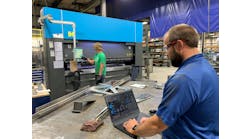Despite all the romance and riches associated with icons from Thomas Edison to Steve Jobs, innovating is often a lonely and thankless job. Sadly, this is as true in control and automation as it is in every other technical field. For instance, I've been covering the New Sampling/Sensor Initiative (NeSSI) since Parker-Hannifin (www.parker.com) parked its big semi-trailer outside the ISA Expo several years ago at the Reliant Center in Houston, and let everyone come in and play with all the little, square metal Legos that make up the specification's Generation I standardized substrate, modules, connectors and fasteners. Then and now, NeSSI seems like an elegant replacement for all the customized tubing and fittings that make up traditional sampling systems, and one that could easily be adopted by users in process applications worldwide.
Based on the ISA SP76 standard, NeSSI's Generation I was launched in 2000 by the Center for Process Analytical Chemistry (www.CPAC.Washington.edu) at the University of Washington, Seattle. CPAC and NeSSI's other supporters released its Generation II specification for automation and communications in 2004 and, more recently, its Generation III specification for microanalytical devices.
Unfortunately, ongoing disagreements over which communications bus Generation II should use, Intrinsically Safe CANbus or i2C, have kept it up in the air for several years, and so users have been even more hesitant about adopting it than they might be otherwise. This is yet another unnecessary shame.
Once again, excessively territorial suppliers and overly cautious users are holding back technology that could undoubtedly bring each huge long-term benefits to them both if they could just compromise a little now.
This is an old story. I'm sure if wireless and Ethernet hadn't upended the fieldbus bickering, then the players involved wouldn't have cooperated to the limited extent they have in recent years. I've been told that PLCs had an unbelievably hard time replacing relays, and that pneumatics bedeviled relays before that.
So I always wonder how far back in time rejection of innovation could possibly go. I mean, the first poor hunter-gatherer who came up with sharpening a stick to use as a spear was no doubt met with shouts of, "That will never work! That stick is too flimsy! We've always used clubs! If they're not broke, don't fix them!"
Consequently, to successfully turn their ideas into reality, true innovators mustn't allow themselves to be held back by obstacles, seemingly unending resistance, and the very likely lack and even withholding of recognition and reward. Many innovations and their supporters cry in wilderness and then become 20-year overnight success when their idea reaches some kind of critical mass and becomes obvious to one and all. What's almost never mentioned or understood is that these are the lucky ones.
I know of more than a few good ideas and innovators that emerged only to be immediately passed up by something better, or were only applied in the small sphere where they were invented, or failed to find the resources and development they needed to grow, or were quashed when their inventors pursued another direction or were halted by a lack of self-confidence.
However, these arguments don't stop professional innovators. For them, all that matters is the idea itself and getting it out to the world and those who can benefit from it. They remember it only takes one early adopter, prospective employer or potential partner to say "yes." The same is true for new ideas. Yes, many innovations will wither for lack of support, and many inventors will go unsung. However, they still must be ready and able to act when an opportunity shows up to take their idea into the larger world. It's been said that there's nothing more powerful than an idea whose time has come, but its backers must be ready when it does.
Besides, doing the right thing in spite of circumstances is what professionals do. I sure hope NeSSI gets its day in the sun, too.





